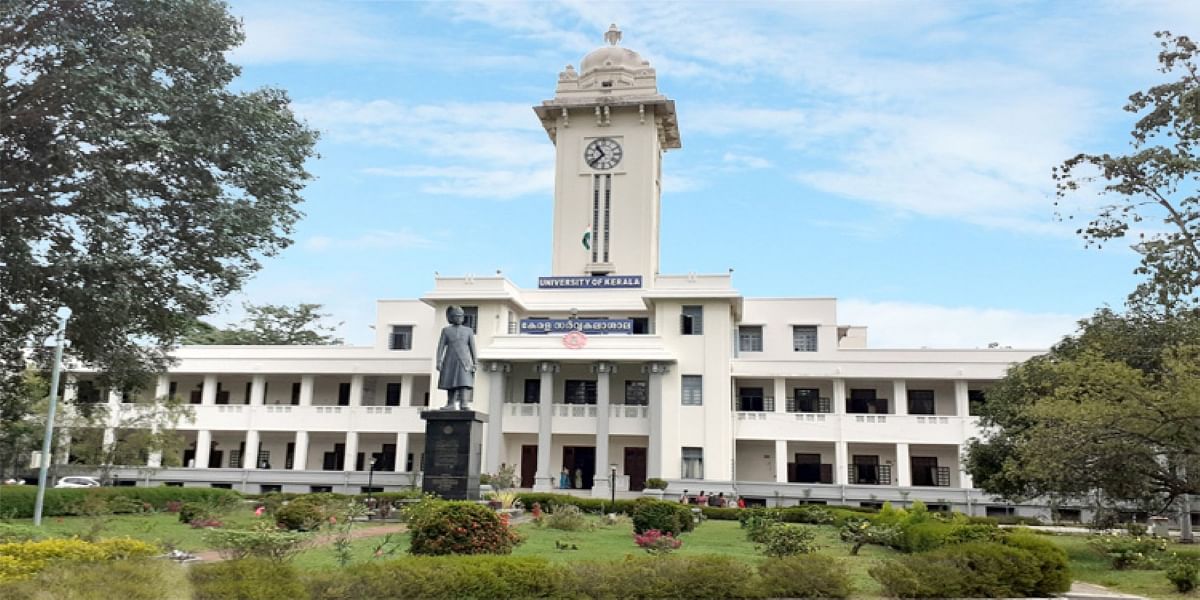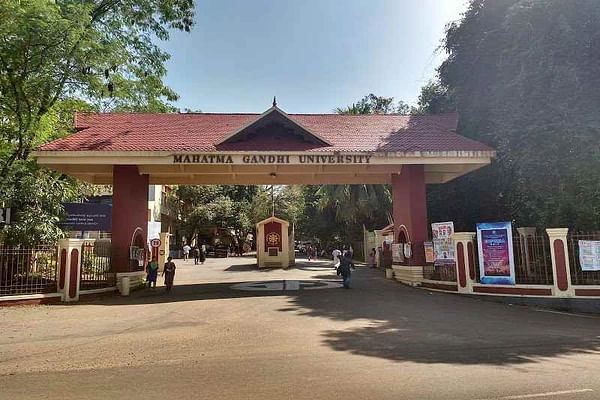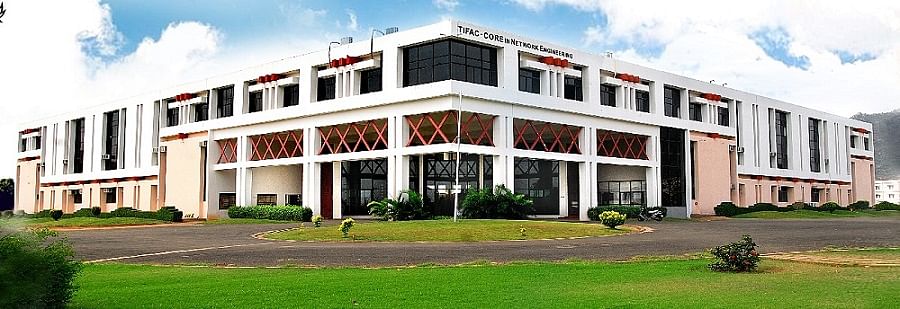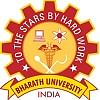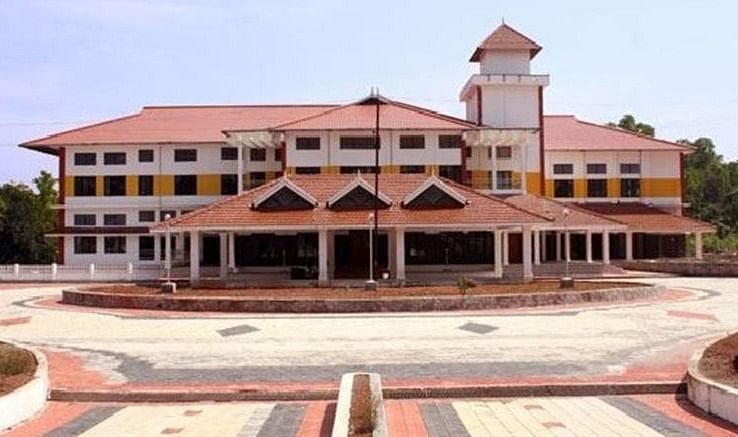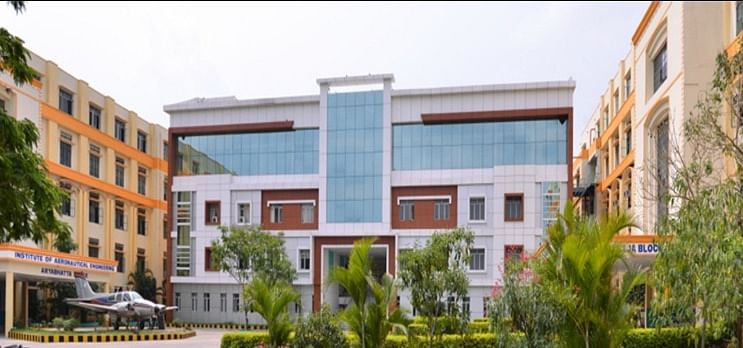B.Tech Aeronautical Engineering Syllabus and Subjects

The BTech Aeronautical Engineering syllabus provides a comprehensive understanding and theoretical and practical exposure to aviation and avionics operations in commercial aviation and defense jets. Btech Aeronautical Engineering subjects are divided into 8 semesters consisting of core and elective subjects, practicals/ laboratory work, industrial training, projects, and seminars.
The core BTech Aeronautical Engineering subjects include Engineering Physics, Engineering Mechanics, Aerodynamics, Low-Speed Aerodynamics, Aircraft Propulsion, Space Propulsion, Vibration and Aero-elasticity, etc. Students can also choose elective subjects such as Advanced Solid Mechanics, Rockets and Missiles, Hypersonic Aerodynamics, Industrial Aerodynamics, Heat Transfer, CAD/CIM, etc.
The BTech Aeronautical Engineering course helps students develop technical skills in the fields of aeronautics, aerodynamics, aircraft design, aircraft systems and controls, etc., and build a career as a Flight Mechanics Engineer, Assistant Aircraft Engineer, Aircraft Production Engineer, etc, etc.
Table of Contents
- Semester Wise BTech Aeronautical Engineering Syllabus
- BTech Aeronautical Engineering First Year Syllabus
- BTech Aeronautical Engineering Second Year Syllabus
- BTech Aeronautical Engineering Third Year Syllabus
- BTech Aeronautical Engineering Fourth Year Syllabus
- BTech Aeronautical Engineering Subjects
Semester-Wise BTech Aeronautical Engineering Syllabus
The B.Tech Aeronautical Engineering syllabus is divided into 8 semesters in 4 years. The Aeronautical Engineering subjects for 1st year focus on engineering fundamentals, whereas, the second to fourth-year syllabus delves into advanced topics in the aeronautical engineering field. Listed below is the semester-wise BTech Aeronautical Engineering syllabus:
BTech Aeronautical Engineering Syllabus First Year
BTech Aeronautical Engineering 1st year syllabus covers subjects like Mathematics, Engineering Physics, Chemistry, Engineering Mechanics, etc. The first and B Tech Aeronautical Engineering 2nd semester syllabus contains mainly the foundational subjects of engineering.
Below is the B.Tech Aeronautical Engineering syllabus for 1st year:
|
Semester I |
Semester II |
|
Mathematics - I |
Mathematics - II |
|
Engineering Physics |
Chemistry |
|
Programming for Problem Solving |
Engineering Mechanics |
|
Engineering Graphics |
Engineering Workshop |
|
Environmental Science |
English |
B.Tech Aeronautical Engineering First Year Practicals
Following are the practical subjects available under the 1st and B.Tech Aeronautical Engineering 2nd sem syllabus:
- Engineering Physics Laboratory Work
- Programming for Problem-Solving Laboratory Work
- Engineering Chemistry Laboratory Work
- English Language and Communication Skills Laboratory Work
B.Tech Aeronautical Engineering Second Year Syllabus
BTech Aeronautical Engineering 2nd year syllabus delves into sub-topics of fundamental topics like fluid mechanics and hydraulics, aircraft materials and production, aero-thermodynamics, etc. Below listed is the B.Tech Aeronautical Engineering 2nd year syllabus:
|
Semester III |
Semester IV |
|
Probability and Statistics & Complex Variables |
Probability Distributions and Numerical Methods |
|
Basic Electrical and Electronics Engineering |
Low-Speed Aerodynamics |
|
Theory of Structures |
Aircraft Materials and Production |
|
Fluid Mechanics and Hydraulics |
Analysis of Aircraft Structures |
|
Aerodynamics - I |
Aero-Thermodynamics |
|
Constitution of India |
B.Tech Aeronautical Engineering Second Year Practicals
Following are the practical subjects available under the B.Tech Aeronautical Engineering syllabus for 2nd year:
- Mechanics of Solids Laboratory Work
- Fluid Mechanics and Hydraulics Laboratory Work
- Basic Electrical and Electronics Engineering Laboratory Work
- Aerodynamics Laboratory Work
- Aerospace Structures Laboratory Work
- Aircraft Materials and Production Laboratory Work
- Gender Sensitization Laboratory Work
B.Tech Aeronautical Engineering Syllabus Third Year
BTech Aeronautical Engineering syllabus in 3rd year focuses on advanced topics like aircraft propulsion, high-speed aerodynamics, space propulsion, helicopter aerodynamics, etc. Below listed is the BTech Aeronautical Engineering third year syllabus:
|
Semester V |
Semester VI |
|
Aircraft Propulsion |
Space Propulsion |
|
High-Speed Aerodynamics |
Computational Aerodynamics |
|
Finite Element Methods |
Helicopter Aerodynamics |
|
Business Economics and Financial Analysis |
Professional Elective - I |
|
Aircraft Systems and Controls |
Open Elective - I |
|
Aircraft Performance and Stability |
Aircraft Design |
|
Computer-Aided Aircraft Engineering Drawing |
Environmental Science |
|
Intellectual Property Rights |
B.Tech Aeronautical Engineering Third Year Practicals
Following are the practical subjects available under the B.Tech Aeronautical Engineering 3rd year syllabus:
- Flight Control Laboratory Work
- Aircraft Propulsion Laboratory Work
- Aerospace Propulsion Laboratory Work
- CFD Laboratory Work
- Advanced Communication Skills Laboratory Work
B.Tech Aeronautical Engineering Fourth Year Syllabus
B.Tech Aeronautical Engineering 4th year syllabus focuses on imparting knowledge and practical skills through elective subjects, projects, seminars, and internships. Below listed is the BTech Aeronautical Engineering syllabus for 4h year:
|
Semester VII |
Semester VIII |
|
Vibration and Aero-elasticity |
Professional Elective – V |
|
Professional Elective – II |
Professional Elective - VI |
|
Professional Elective – III |
Open Elective - III |
|
Professional Elective - IV |
Project Stage - II |
|
Open Elective - II |
|
|
Industrial-Oriented Mini Project/ Summer Internship |
|
|
Seminar |
|
|
Project Stage - I |
B.Tech Aeronautical Engineering Fourth Year Practicals
Following are the practical subjects available under the B.Tech Aeronautical Engineering 4th year syllabus:
- Vibration and Aero-elasticity Laboratory Work
BTech Aeronautical Engineering Subjects
B.Tech Aeronautical Engineering subjects can be divided into core and elective subjects. Students can choose elective BTech Aeronautical Engineering subjects based on their future education goals, personal interests, or career scopes.
Apart from core subjects, there are some elective subjects from the sixth semester onwards. Students can choose their electives from the options provided to them by their institution. Explore the detailed BTech Aeronautical Engineering Year-wise subjects and their topics below.
BTech Aeronautical Engineering First Year Subjects
The first year BTech Aeronautical Engineering subjects cover foundational concepts like Harmonic Oscillations, Orthographic Projections, Kinetics of Rigid Bodies, etc. Listed below are the first sem and B Tech Aeronautical Engineering 2nd sem subjects.
|
Subjects |
Topics Covered |
Subject Type |
|
Mathematics - I |
Matrices, Eigen Values and Eigen Vectors, Sequences & Series, Calculus, Multivariable Calculus (Partial Differentiation and Applications), etc. |
Core |
|
Engineering Physics |
Introduction to Mechanics, Harmonic Oscillations, Waves in One Dimension, Wave Optics, Lasers and Fibre Optics, etc. |
Core |
|
Programming for Problem Solving |
Introduction to Programming, Arrays, Strings, Structures and Pointers, Preprocessor and File handling in C, Function and Dynamic Memory Allocation, Introduction to Algorithms, etc. |
Core |
|
Engineering Graphics |
Introduction to Engineering Drawing, Orthographic Projections, Projections of Regular Solids, Development of Surfaces of Right Regular Solids, Isometric Projections, etc. |
Core |
|
Environmental Science |
Ecosystems, Natural Resources, Biodiversity and Biotic Resources, Environmental Pollution and Control Technologies, Environmental Policy, Legislation & EIA, etc. |
Core |
|
Mathematics - II |
First Order ODE, Ordinary Differential Equations of Higher Order, Multivariable Calculus (Integration), Vector Differentiation, Vector Integration, etc. |
Core |
|
Chemistry |
Molecular Structure and Theories of Bonding, Water and its Treatment, Electrochemistry and Corrosion, Stereochemistry, Reaction Mechanism and Synthesis of Drug Molecules, Spectroscopic Techniques and Applications, etc. |
Core |
|
Engineering Mechanics |
Introduction to Engineering Mechanics, Friction, Area Moment of Inertia, Review of Particle Dynamics, Kinetics of Rigid Bodies, etc. |
Core |
|
Engineering Workshop |
Trades for Exercises (Carpentry, Fitting, Tin-Smithy, Foundry, Welding Practice, House-Wiring, and Black Smithy); Trades for Demonstration and Exposure (Plumbing, Machine Shop, Metal Cutting (Water Plasma), Power tools in construction and Wood Working) |
Core |
|
English |
The Raman Effect, Ancient Architecture in India, Blue Jeans, What Should You Be Eating, How a Chinese Billionaire Built Her Fortune, etc. |
Core |
BTech Aeronautical Engineering Second Year Subjects
The second year BTech Aeronautical Engineering subjects explore topics like basic probability, fluid dynamics, finite wing theory, etc. The BTech Aeronautical Engineering second year subjects and topics covered are detailed in the table below.
|
Subjects |
Topics Covered |
Subject Type |
|
Probability and Statistics & Complex Variables |
Basic Probability, Probability Distributions, Testing of Hypothesis, Complex Variables (Differentiation), Complex Variables (Integration), etc. |
Core |
|
Basic Electrical and Electronics Engineering |
DC Circuits and AC Circuits, Electrical Installations, Electrical Machines, PN Junction and Zener Diode, Rectifiers and Filters, Bipolar Junction Transistor (BJT), Field Effect Transistor (FET), etc. |
Core |
|
Theory of Structures |
Introduction, Stresses in Beams, Beams and Columns, Redundant Structures, Theory of Elasticity, etc. |
Core |
|
Fluid Mechanics and Hydraulics |
Fluid Properties and Fluid Statics, Fluid Kinematics and Basic Equations of Fluid Flow Analysis, Fluid Dynamics, Boundary Layer Theory and Pipe Flow, Turbo Machinery, etc. |
Core |
|
Aerodynamics - I |
Introductory Topics for Aerodynamics, Potential Flow, Finite Wing Theory, Flow Past Non-Lifting Bodies and Interference Effects, Conformal Transformation, etc. |
Core |
|
Constitution of India |
Meaning of the constitution law and constitutionalism, Historical perspective of the Constitution of India, Salient features and characteristics of the Constitution of India, Scheme of the fundamental rights, The scheme of the Fundamental Duties and its legal status, etc. |
Core |
|
Probability Distributions and Numerical Methods |
Multiple Random variables, Correlation & Regression, Stochastic Processes, Solution of Algebraic, Transcendental Equations and Curve Fitting, Interpolation and Numerical Differentiation, Integration and Solution of Ordinary Differential Equations of First Order, etc. |
Core |
|
Low-Speed Aerodynamics |
Aerofoil and Wing, Forces and Moments on Aircraft, Propellers and Propulsion, Introduction to Steady Flight Performance, Boundary Layer Theory, etc. |
Core |
|
Aircraft Materials and Production |
Aircraft Engineering Materials, Casting, Welding and Inspection Techniques, Sheet Metal Processes in Aircraft Industry, Conventional and Unconventional Machining Processes, Aircraft Composites, etc. |
Core |
|
Analysis of Aircraft Structures |
Introduction to Aircraft Structural Components and Energy Methods, Thin Plate Theory, Structural Instability, Bending, Shear and Torsion of Thin-Walled Beams, Structural Idealization, Analysis of Fuselage, Wing and Landing Gear, etc. |
Core |
|
Aero-Thermodynamics |
First Law of Thermodynamics, Second Law of Thermodynamics, Properties of Pure Substances and Power Cycle, Air Standard Cycles and IC Engines, Refrigeration, Air Conditioning and Psychrometry, etc. |
Core |
BTech Aeronautical Engineering Third Year Subjects
The third-year B.Tech Aeronautical Engineering subjects offer topics like air-breathing engine classes, finite element methods, aircraft systems, aircraft performance, etc. Listed below are the B.Tech Aeronautical Engineering subjects for the third year along with their topics covered.
|
Subjects |
Topics Covered |
Subject Type |
|
Aircraft Propulsion |
Air-Breathing Engines Classes, Air-Breathing Engines Classes, Nozzles, Compressors, Turbines, etc. |
Core |
|
High-Speed Aerodynamics |
Introduction to Compressible Flows, Shock and Expansion Waves, One-Dimensional and Quasi One-Dimensional Flow, Applications of Compressible Flows and Numerical Techniques, Experimental Methods in Compressible Flows, etc. |
Core |
|
Finite Element Methods |
Introduction to Finite Element Methods, Analysis of Trusses, Analysis of Beams, Finite Element Modeling, Steady State Heat Transfer Analysis, Dynamic Analysis, etc. |
Core |
|
Business Economics and Financial Analysis |
Introduction to Business and Economics, Demand and Supply Analysis, Production, Cost, Market Structures & Pricing, Financial Accounting, Financial Analysis through Ratios, etc. |
Core |
|
Aircraft Systems and Controls |
Introduction To Aircraft Systems, Electrical Systems and Air Conditioning, Pressurizing Systems, Hydraulic Systems and Pneumatic Systems, Engine Control and Fuel Systems, Airplane Control Systems, etc. |
Core |
|
Aircraft Performance and Stability |
Introduction to Aircraft Performance, Cruise Performance, Climb and Decent Performance, Aircraft Manoeuvre Performance, Safety Requirements -Take-off And Landing Performance and Flight Planning, etc. |
Core |
|
Computer-Aided Aircraft Engineering Drawing |
Sketcher, Part Design, Sheet Metal Design, Surface Design, Assembly, GD&T, Drafting, Design of Aircraft Wing, Design of Fuselage, Design of Nose Cone, Design of Landing Gear, etc. |
Core |
|
Intellectual Property Rights |
Introduction to Intellectual Property, Trade Marks, Law of Copyrights, Law of Patents, Trade Secrets, New Development of Intellectual Property, International Overview on Intellectual Property, etc. |
Core |
|
Space Propulsion |
Principles of Rocket Propulsion, Fundamentals of Rocket Propulsion, Solid Rocket Propulsion, Liquid and Hybrid Rocket Propulsion, Advanced Propulsion Techniques, etc. |
Core |
|
Computational Aerodynamics |
Introduction to Computational Aerodynamics, Mathematical Behavior of Partial Differential Equations and Their Impact On Computational Aerodynamics, Basic Aspects of Discretization, CFD Techniques, Finite Volume Methods, etc. |
Core |
|
Helicopter Aerodynamics |
Elements of Helicopter Aerodynamics, Ideal Rotor Theory, Power Estimates, Lift, Propulsion and Control of VSTOL Aircraft, Ground Effect Machines, etc. |
Core |
|
Advanced Solid Mechanics |
Traction and Stresses, Axisymmetric Analysis, Bending of Curved Beams, Fracture Mechanics Classes, Theories of Failure, etc. |
Professional Elective - I |
|
Design and Analysis of Composite Structures |
Stress-strain relation, Methods of Analysis, Laminated Plates, Sandwich Constructions and Fabrication Process, Damage Tolerance In Composites, Testing of Composite Structures, etc. |
Professional Elective - I |
|
Unmanned Air Vehicles |
Introduction to Unmanned Aircraft Systems, Aerodynamics and Airframe Configurations, Characteristics of Aircraft Types, Communications Navigation, Control and Stability, etc. |
Professional Elective - I |
|
Aircraft Design |
Overview of The Design Process, Initial Sizing and Configuration Layout, Propulsion, Fuel System Integration, Landing Gear and Baseline Design Analysis – I, Baseline Design Analysis – II, Cost Estimation, Parametric Analysis, Optimisation, Refined Sizing and Trade Studies, etc. |
Core |
|
Environmental Science |
Ecosystems, Natural Resources, Biodiversity And Biotic Resources, Environmental Pollution and Control Technologies, Environmental Policy, Legislation & EIA, etc. |
Core |
B.Tech Aeronautical Engineering Fourth Year Subjects
The fourth-year B.Tech Aeronautical Engineering subjects deal with concepts like Basic Motions, Space Mechanics, Rocket Dynamics, Principles of Model Testing, etc. Listed below are the B.Tech Aeronautical Engineering subjects and the topics covered under them.
|
Subjects |
Topics Covered |
Subject Type |
|
Vibration and Aero-elasticity |
Basic Motions, Single Degree of Freedom Systems, Multi Degree of Freedom Systems, Approximate Methods, Elements of Aeroelasticity, etc. |
Core |
|
Space Mechanics |
Introduction to Space Mechanics, The Two-Body Problem, Perturbed Satellite Orbit, Ballistic Missile Trajectories, Low-Thrust Trajectories, etc. |
Professional Elective – II |
|
Rockets and Missiles |
Rocket Dynamics, Solid Propulsion and Pyrotechnics, Liquid Propulsion and Control Systems, Multi-Staging of Rocket and Separation Dynamics, Design, Materials and Testing of Rockets, etc. |
Professional Elective – II |
|
Wind Tunnel Technique |
Principles of Model Testing, Types and Functions of Wind Tunnels, Calibration of Wind Tunnels, Calibration of Wind Tunnels, Special Wind Tunnel Techniques, etc. |
Professional Elective – II |
|
Experimental Aerodynamics |
Basic Measurements in Fluid Mechanics, Characteristics of Measurements, Flow Visualization and Analogue Methods, Pressure, Velocity and Temperature Measurements, Special Flows and Uncertainty Analysis, etc. |
Professional Elective – III |
|
Hypersonic Aerodynamics |
Fundamentals Of Hypersonic Aerodynamics, Simple Solution Methods For Hypersonic Inviscid Flows, Viscous Hypersonic Flow Theory, Viscous Interactions In Hypersonic Flows, High-Temperature Effects in Hypersonic Flows, etc. |
Professional Elective – III |
|
Advanced Computational Aerodynamics |
Numerical Solutions, Time-Dependent Methods, Boundary Conditions, Method of Characteristics, Panel Methods, etc. |
Professional Elective – III |
|
Industrial Aerodynamics |
Atmosphere, Wind Energy Collectors, Vehicle Aerodynamics, Building Aerodynamics, Flow-Induced Vibrations, etc. |
Professional Elective - IV |
|
Turbo Machinery |
Introduction to Turbomachinery, Fundamental Concepts of Axial and Radial Machines, Gas Dynamics, Centrifugal Compressors, Axial Flow Compressors, Cascade Analysis, Axial Flow Gas Turbines, etc. |
Professional Elective - IV |
|
Theory of Combustion |
Basics of Combustion Theory, Pre-Mixed Flames, Diffusion Flame, Combustion in Reciprocating and Gas-Turbine Engines, Combustion in Rocket Engines and Emission, etc. |
Professional Elective - IV |
|
Heat Transfer |
Introduction, Conduction Heat Transfer, One Dimensional Steady State Conduction Heat Transfer, One Dimensional Transient Conduction Heat Transfer, Convective Heat Transfer, Internal Flows, Heat Transfer with Phase Change, etc. |
Professional Elective – V |
|
Cryogenics |
Introduction to Cryogenics, Properties of Cryogenic Substance, Cryogenic Insulations, Storage and Instrumentation of Cryogenic Liquids, Cryogenic Equipment, etc. |
Professional Elective – V |
|
Aero Engine Design |
Fundamentals Of Engine Design, Constraint Analysis and Mission Analysis, Engine Selection, Engine Sizing, Engine Component Operation, etc. |
Professional Elective – V |
|
Precision Engineering |
Accuracy and Alignment Tests, Influence of Static Stiffness, Thermal Effects, Precision Machining, Nano Measuring Systems, Lithography, etc. |
Professional Elective - VI |
|
Practical Non-Destructive Testing |
Overview of Non-Destructive Testing, Surface Non-Destructive Examination Methods, Thermography and Eddy Current Testing (ET), Ultrasonic Testing (UT) and Acoustic Emission (AE), Experimental Methods, etc. |
Professional Elective - VI |
|
CAD/CIM |
Introduction, Geometric Modelling, Group Technology Computer Aided Process Planning, Computer Aided Planning and Control, Shop Floor Control and Introduction to FMS, Computer Aided Planning and Control and Computer Monitoring, etc. |
Professional Elective - VI |
B.Tech Aeronautical Engineering Course Structure
B.Tech Aeronautical Engineering syllabus structure involves application-based engineering study. The course focuses on applied mechanical engineering concepts along with electronics for aeronautical operations. In short, the course structure is as follows:
- VIII Semesters
- Fundamental, core, and elective subjects
- Mandatory internship/Pilot training
- Project Submission
B.Tech Aeronautical Engineering Teaching Methodology and Techniques
B.Tech Aeronautical Engineering teaching methodology is quite different from other engineering subjects since this is an applied specialization. Apart from the traditional lecture-based training, the students are also provided additional practical training with the aid of state-of-the-art technology labs, projects, and piloting activities.
In short, the teaching methodology adopted for this course is as follows:
- Practical sessions
- Group projects
- Voyage
- Workshop
- Industrial visits
- Internship
B.Tech Aeronautical Engineering Projects
B.Tech Aeronautical Engineering projects are generally done on specific aviation and aerospace operations and aerospace technology. The students are given adequate practical training to understand the nuances of workflow for problem identification.
- Underwater Sea Monitoring Robot
- Automated Navigation tracker
- Automatic Propulsion Accident Alert System
- Space Rover Robot
- Alternate Fuel for Fighter Jet Engines
BTech Aeronautical Engineering Books
B.Tech Aeronautical Engineering books help students understand concepts related to Engineering Physics, Engineering Mechanics, Aerodynamics, Aircraft Materials and Production, Aircraft Propulsion, Space Propulsion, Aircraft Design, Vibration and Aero-elasticity, etc.
The year-wise BTech Aeronautical Engineering books relevant to the B Tech Aeronautical Engineering syllabus are detailed in the sections below.
BTech Aeronautical Engineering Books First Year
Students must refer to the B.Tech Aeronautical Engineering 1st year syllabus to know the names of the relevant books. The BTech Aeronautical Engineering 1st year books are listed in the table below:
|
Books |
Author |
Topics Covered |
|
Mathematical Methods |
P.B.Bhaskara Rao, S.K.V.S. Rama Chary, M.Bhujanga Rao |
Matrices & Linear Systems of Equations, Eigen Values and Eigen Vectors and their Applications, Properties of Eigen Values of complex Matrices & Quadratic Forms, Iterative Methods and Integration, Regression Methods, Numerical Differentiation & Integration, etc. |
|
Applied Physics |
P.K.Palanisamy |
Bonding in solids, Crystal structures and x-ray diffraction, Principles of quantum mechanics, Electron theory of metals, Band theory of solids, etc. |
|
Computer Architecture: A Quantitative Approach |
Hennessey and Patterson |
Quantitative Design and Analysis, Memory Hierarchy Design, Memory Hierarchy Design and Its Exploitation, Data-Level Parallelism in Vector, SIMD, and GPU Architectures, Thread-Level Parallelism, etc. |
|
Data Structures |
Thomas Cormen |
Sorting and Order Statistics, Data Structures, Advanced Design and Analysis Techniques, Advanced Data Structures, Graph Algorithms, etc. |
|
Textbook of Engineering Chemistry |
C.P. Murthy, C.V. Agarwal, A. Naidu |
Water and its Industrial Applications, Fuels and Combustion(chemical Fuel), Lubricants, Cement and Refractories, High Polymers: Plastics Rubbers Conducting polymers and liquids crystals, Spectroscopy, Water Analysis, etc. |
BTech Aeronautical Engineering Books Second Year
The BTech Aeronautical Engineering 2nd year books are provided in the table below for students' reference:
|
Books |
Author |
Topics Covered |
|
Data Structures Through C (A Practical Approach) |
G.S.Baluja |
An Introduction To Data Structures, Recursion – A Breath Breaker, Arrays, Strings, Stacks, Queues, etc. |
|
Computer System Architecture |
M. Morris Mano |
Digital Logic Circuits, Digital Components, Data Representation, Register Transfer and Microoperaions, Basic Computer Organization and Design, etc. |
|
A Textbook of Discrete Mathematics |
Dr. Swapan Kumar Sarkar |
Mathematical Logic, Boolean Algebra and Logic Circuits, Set Theory, Matrices, Number Theory, etc. |
|
Software Engineering |
KK. Aggarwal and Yogesh Singh |
Software Maintenance, Software Testing, Software Project Planning, Data Flow Diagrams and Context Diagrams, etc. |
|
Operating Systems Concepts |
Avi Silberschatz, Peter Baer Galvin,Greg Gagne |
Process Management, Memory Management, Storage Management, Protection and Security, etc. |
BTech Aeronautical Engineering Books Third Year
The BTech Aeronautical Engineering 3rd year books used by most of the institutions in India are provided below:
|
Books |
Author |
Topics Covered |
|
Computer Graphics: Principles and Practice |
James D. Foley, Andries van Dam, Steven K. Feiner, John Hughes |
2D Graphics Using WPF, An Ancient Renderer Made Modern, A 2D Graphics Test Bed, An Introduction to Human Visual Perception, Introduction to Fixed-Function 3D Graphics and Hierarchical Modeling, etc. |
|
Fundamentals of Computer Graphics |
Peter Shirley, Steve Marschner |
Raster Images, Ray Tracing, Linear Algebra, Transformation Matrices, Viewing, etc. |
|
Introduction To The Design and Analysis of Algorithms |
Anany Levitin |
Fundamentals of the Analysis of Algorithm Efficiency, Brute Force and Exhaustive Search, Decrease-and-Conquer, Divide-and-Conquer, Transform-and-Conquer, etc. |
|
Artificial Intelligence |
Patrick Henry Winston |
The Intelligent Computer, Semantic Nets, Description Matching, Generate and Test, Means-Ends Analysis, Problem Reduction, Nets, Basic Search, etc. |
|
Programming With Java |
E Balagurusamy |
Fundamentals of Object-Oriented Programming, Java Evolution, Overview of Java Language, Constants, Variables, and Data Types, Operators and Expressions, etc. |
BTech Aeronautical Engineering Books Fourth Year
Students are advised to refer to the BTech Aeronautical Engineering 4th year books listed in the table below:
|
Books |
Author |
Topics Covered |
|
Cloud Computing: A Practical Approach |
Anthony Velte. Toby Velte, Robert C. Elsenpeter |
The History and Future of Cloud Computing, Cloud Computing Basics, Your Organization and Cloud Computing, Cloud Computing with the Titans (Google, Microsoft, Amazon, Yahoo), The Business Case for Going Cloud, etc. |
|
Digital Image Processing |
William K. Pratt |
Continuous Image Mathematical Characterization, Psychophysical Vision Properties, Photometry and Colorimetry, Image Sampling and Reconstruction, Image Sampling and Reconstruction, etc. |
|
Embedded Systems |
Raj Kamal |
Introduction to Embedded Systems: Hardware and Software Concepts, System-on-Chip, NoC, Embedded Hardware Modelling and Design, 8051, AVR ATmega, MSP 430 and ARM Microcontrollers, Sensors, A/D–D/A Converters, Actuators and Interfacing, IoT – System Architecture and Design, etc. |
|
Enterprise Cloud Computing |
Gautam Shroff |
Computing Platforms, Cloud Platforms, Cloud Technologies, Cloud Development, Software Architecture, etc. |
|
JAVA Enterprise Design Patterns Vol – III |
Mark Grand |
Introduction to Software Patterns, Overview of UML, The Software Life Cycle, Transaction Patterns, Distributed Architecture Patterns, etc. |
Top B.Tech Aeronautical Engineering Colleges
Top Engineering Entrance Exams
B.Tech Aeronautical Engineering Fee Structure
FAQs
How is assessment conducted in the BTech Aeronautical Engineering course?
The assessment criteria for the BTech Aeronautical Engineering course are based on the fact that after completing the course students must have a clear understanding of fluid mechanics, thermodynamics, aerodynamics, aircraft propulsion, aircraft design, etc.
How many subjects are there in the BTech Aeronautical Engineering course?
The number of subjects in the BTech Aeronautical Engineering course depends on the university curriculum. The syllabus comprises core and elective subjects, where students can select 3-4 elective subjects out of elective subjects offered by the college.
What are common elective subjects in BTech Aeronautical Engineering?
The common elective subjects in BTech Aeronautical Engineering are Advanced Solid Mechanics, Space Mechanics, Hypersonic Aerodynamics, Turbo Machinery, Cryogenics, CAD/CIM, etc.
What topics are covered in Aerodynamics-I in the Aeronautical Engineering syllabus?
The topics covered in Aerodynamics-I in the BTech Aeronautical Engineering syllabus are Potential Flow, Finite Wing Theory, Flow Past Non-Lifting Bodies and Interference Effects, Conformal Transformation,, etc.
What kind of projects do students work on during their B.Tech Aeronautical Engineering course?
During the B.Tech Aeronautical Engineering course, students mainly work on projects that focus on aerodynamics, aircraft propulsion, aerospace structures, fluid mechanics, and other aircraft technologies.
What communication skills are developed in the BTech Aeronautical Engineering course?
Students develop communication skills such as technical writing, oral communication, effective presentation skills, report writing, business communication, etc., in the BTech Aeronautical Engineering course.




